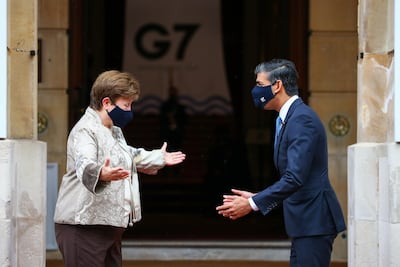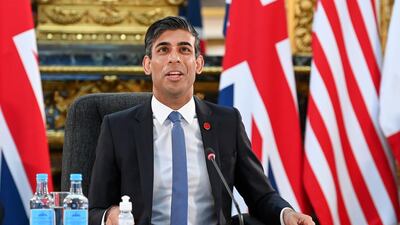Britain's Chancellor of the Exchequer, Rishi Sunak, said he was "determined" to secure a fair deal on global taxation as finance ministers from the G7 economies gathered in London before a meeting on Friday.
Finance leaders from the US, Japan, France, Canada, Germany and Italy will discuss a global minimum tax rate with Mr Sunak at the two-day meeting at Lancaster House in London, as the part of the UK's G7 presidency.
The minimum rate would prevent major corporations from cheating the system by shifting profits to countries with low corporate tax rates, while boosting government revenue after the pandemic.
Mr Sunak on Thursday said he was confident the ministers would agree on action to benefit the global economy as the world emerged from the Covid-19 pandemic.
“Securing a global agreement on digital taxation has also been a key priority this year," Mr Sunak said on Thursday.
"We want companies to pay the right amount of tax in the right place, and I hope we can reach a fair deal with our partners.
“I’m determined we work together and unite to tackle the world's most pressing economic challenges, and I’m hugely optimistic that we will deliver some concrete outcomes this weekend.”
Finance ministers from France, Germany, Italy and Spain backed Mr Sunak's pledge on Friday and said a G7 deal on a minimum corporate tax rate was "within sight".
"We have a chance to get multinational businesses to pay their fair share," France's Bruno Le Maire, Germany's Olaf Scholz, Italy's Daniele Franco and Spain's Nadia Calvino wrote in a joint opinion piece in The Guardian.
"For more than four years, France, Germany, Italy and Spain have been working together to create an international tax system fit for the 21st century. It is a saga of many twists and turns. Now it's time to come to an agreement."
Reaching an international agreement on how large digital companies are taxed has been a priority for Mr Sunak since he took office last year, the Treasury says.
The chancellor is set to focus on a pact that ensures large companies pay an appropriate level of tax that reflects their economic activity in the UK.
The acceleration in talks came after the US agreed to accept a minimum corporation tax rate of at least 15 per cent last month, unblocking stalled global tax negotiations and raising prospects of an agreement this year.

But key aspects such as the actual rate are still to be decided, with an endorsement from the G7 key to build support for a taxation deal in continuing talks led by the Organisation for Economic Co-operation and Development, which involve more than 140 countries and are being held in Paris.
While the US has suggested a 15 per cent rate, down from its original proposal of 21 per cent, it is far higher than Ireland, which currently has a12.5 per cent corporate levy.
A G7 agreement to establish a minimum tax rate on big tech and other companies could bring in more than $200 billion a year in revenue for British and EU governments if a higher tax rate of 25 per cent were agreed to by the G7, research released by the European Tax Observatory shows.
If a deal can be agreed by finance ministers, the G7 could then sign it off at the Cornwall summit on June 11 to 13 and present a plan to the 140 nations negotiating the OECD’s “inclusive framework”.
A G7 agreement would also provide momentum for advancing global corporate tax negotiations towards a broader G20 finance meeting in July in Italy.
"The new US proposal on minimal taxation is an important step in the direction of the proposal initially floated by our countries and taken over by the OECD," the four ministers from France, Germany, Italy and Spain said.
"The commitment to a minimum effective tax rate of at least 15 per cent is a promising start."
At the G7 meeting on Friday, the finance ministers will discuss support for low income countries as they emerge from the Covid-19 crisis.
Mr Sunak will be looking to secure G7 backing of a new $650bn International Monetary Fund Special Drawing Rights allocation for poorer nations.
He will also urge his fellow ministers to follow the UK commitment to making climate reports, based on the recommendations of the Taskforce on Climate-related Financial Disclosures, mandatory for all large companies across their respective economies.
The UK, which is also hosting the Cop26 environment summit in Glasgow in November, is hoping a G7 agreement this week will build political momentum on the issue.
It would ensure the world’s biggest companies disclose consistent, comparable information to investors on how they are affected by climate change as well as their exposure to risks.
That would allow investors to factor this into investment decisions, and in turn provide capital to support the transition to net zero.
The drive comes as the UK seeks to burnish its post-Brexit credentials as a global leader on climate change.
Prime Minister Boris Johnson has already unveiled the most ambitious target to cut greenhouse gases among major developed countries.


